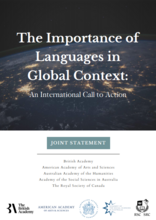“Clear and precise communication is more crucial than ever before to the health and security of every nation.”
For the first time in their histories, five international academies have joined together to ask for increased investment in language education, an unprecedented collaboration at a time of global uncertainty.

The Importance of Languages in Global Context: An International Call to Action is a collaboration of five institutions from nations in which English is a primary language: the American Academy of Arts & Sciences, the British Academy, the Academy of the Social Sciences in Australia, The Australian Academy of the Humanities, and the Royal Society of Canada.
The statement was inspired by the ongoing work of the American and British Academies, which have issued complementary reports on language education in recent years. The American Academy took the lead on this effort as part of its rollout efforts in support of its 2017 report, America’s Languages: Investing In Language Education for the 21st Century.
“We are delighted to have played such an important role in the creation of this joint statement,” said American Academy president David Oxtoby. “Each nation understands its language capacity and needs differently, but we all agree that the ability to speak languages in addition to English will continue to be a critical skill in a shrinking world.”
The joint statement recommends that the nations represented should invest educational resources to support the diversity of languages spoken within their borders, including indigenous languages, and provide greater access to education in a range of languages, even as they strive to improve literacy in English.
To build language skills in countries where English dominates, the academies call for more language education in schools, colleges, universities, and workplaces, with three main goals:
- To celebrate all languages, including those spoken by minority and indigenous populations. This means protecting against discrimination on the basis of language, preserving linguistic diversity and continuing access to education across a full range of languages
- To acknowledge the English language’s position as a world language by enabling full access to literate English, recognizing this may be enhanced by awareness of other languages
- To gain greater language skills by providing every student with access to learning additional languages. This will foster literacy and educational attainment, build confidence, enhance employability, and help them to navigate multicultural environments.
The academies also made the point that students from every socioeconomic background must have equal access to language education to reach their full potential in the 21st century.
“Foreign language learning in the anglophone world has been in decline for too long – and the COVID-19 pandemic is a wake-up call. Anglophone nations need to urgently develop and implement language policies that are explicit, coordinated and comprehensive, making access to the world’s languages a core feature and indispensable part of the education of every student, of every age, beginning with valuing the language(s) learned at home…To work together, the people of the world must be able to speak to each other and be understood,” said Professor Neil Kenny FBA, the British Academy’s lead Fellow for languages.
The statement references current challenges as part of its call for increased investment: “The COVID-19 pandemic has intensified global communications—virtual meetings, streaming cultural content, international news, social media, and so on—but also risks increasing inequalities and heightening racism as well as regional tensions. To solve the problems we face, we must increase our capacity to speak with each other as part of a global community.”
The participating academies see this effort as an important declaration of principle and hope it inspires more discussion, as well as a greater emphasis on language instruction and revitalization.
“The academies have chosen to issue their first joint statement about the kind of world we would like to see and help foster,” Oxtoby said. “We are delighted that our first collaboration addresses such an important issue, and we all look forward to working together on future initiatives.”





